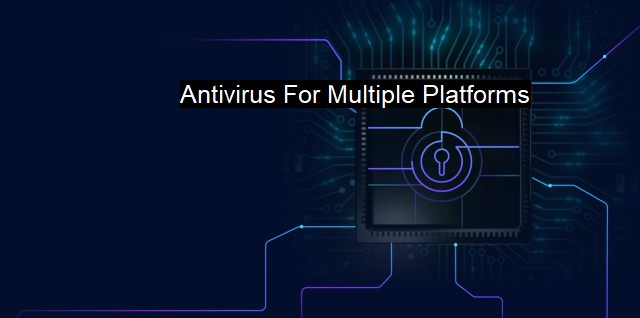What are Antivirus For Multiple Platforms?
The Importance of Antivirus for Multiple Platforms in Cybersecurity: A Comprehensive Guide
Antivirus for multiple platforms refers to a security solution that can protect various operating systems or platforms from potential cyber threats. In today's technological era, it is not uncommon for one to use more than a single operating system, say Windows on the computer, iOS on the iPhone, Android on the tablet, or Linux on the server. In such a scenario, antivirus for multiple platforms plays a crucial role in ensuring comprehensive cybersecurity across all kinds of devices and platforms.In every computing device, may it be a smartphone, computer, tablet, or a server, there is an operating system that hosts all the hardware and software functions of the device. Different platforms have specific weaknesses and vulnerabilities, which, if exploited, can lead to security breaches. Hackers use these vulnerabilities to unleash malicious activities, steal data, trigger hardware failure, or simply disrupt the usual operations of the device.
An antivirus acts as a safeguard against these potential threats. It actively scans the system for any malicious software, blocks and removes malware on sight, and ensures that no unauthorized program executes harmful activities in the system. It monitors all channels and ports through which information flows in and out of the system and compares all programs running on the system against a database of known threats to ensure system safety.
The need for an antivirus for multiple platforms arises due to the variety and complexity of different operating systems. Despite the primary function being the same, namely to ensure cybersecurity, the way an antivirus function can differ slightly depending on the architecture and design of the operating system it needs to protect. the way a Windows antivirus program works is a bit different from how an iOS or Android antivirus works.
For Windows, an antivirus program protects against known threats and monitors system behavior for any suspicious activities. As Windows is widely used and is quite susceptible to malware, these antivirus programs deploy behavioral blocking when a malicious action is attempted, alongside traditional signature-based identification.
While iOS devices have strong in-built defenses and are less susceptible to traditional malware, antivirus applications for iOS are more geared towards protecting from data leaks and shielding online privacy. They might include features like secure browsing, VPNs, and protection against phishing.
In the case of Android which is currently the most widely used mobile OS, antivirus programs provide closer protection against traditional malware due to the open-source nature of Android, and threats posed by downloads from less secure sources apart from Google Play.
In the context of computer servers running on various operating systems like Linux, HP UX, Solaris, etc, antivirus for servers assumes critical importance. Servers hold vast amounts of sensitive information and unauthorized access or any security breach can lead to catastrophic outcomes.
Antivirus for multiple platforms identifies and adjusts its actions based on the device’s OS. They are developed in such a way that they incorporate the features essential for different OS and can dynamically change from one platform to another. Such antivirus software is truly innovative because it provides versatility and ease to users working on multiple platforms without compromising security.
Antivirus for multiple platforms is a one-stop solution for cybersecurity across different devices and operating systems. As our reliance on various devices intertwined through the Internet increases, keeping them secure from potential cyber threats is of utmost importance. This has not only increased the demand for such solutions but also pushed the antivirus vendors to provide advanced, intuitive, and robust antivirus products for the consumer’s varying needs. antivirus for multiple platforms symbolizes a significant progression in the field of cybersecurity.

Antivirus For Multiple Platforms FAQs
What is antivirus for multiple platforms?
Antivirus for multiple platforms is a cybersecurity solution that can be used on different operating systems such as Windows, macOS, and Android devices to protect against various types of malware and cyber threats.Why is it important to have antivirus for multiple platforms?
It is important to have antivirus for multiple platforms because cyber threats can exist on any operating system and can cause severe damage to your system, files, and personal information. With antivirus for multiple platforms, you can protect all your devices from malware and cyber threats.What features should I look for in an antivirus for multiple platforms?
Some features you should look for in an antivirus for multiple platforms include real-time protection, web protection, email scanning, malware removal, parental controls, firewall, automatic updates, and compatibility with different operating systems.Are there any free antivirus options for multiple platforms?
Yes, there are free antivirus options for multiple platforms available. However, free antivirus software may have limited features compared to paid versions, and may also include ads or pop-ups. It is important to do research and choose a reputable free antivirus program if you decide to go that route.| | A | | | B | | | C | | | D | | | E | | | F | | | G | | | H | | | I | | | J | | | K | | | L | | | M | |
| | N | | | O | | | P | | | Q | | | R | | | S | | | T | | | U | | | V | | | W | | | X | | | Y | | | Z | |
| | 1 | | | 2 | | | 3 | | | 4 | | | 7 | | | 8 | | |||||||